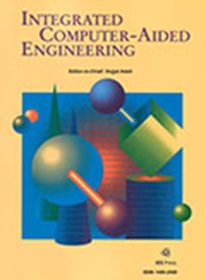基于模因搜索的模糊柔性作业车间能耗降低算法
IF 5.8
2区 计算机科学
Q1 COMPUTER SCIENCE, ARTIFICIAL INTELLIGENCE
引用次数: 1
摘要
柔性作业车间是一个众所周知的调度问题,由于其计算复杂性和在制造和工程过程中的重要性,历来引起了人们的广泛关注。这里我们考虑一个问题的变体,其中操作处理时间的不确定性是用三角模糊数建模的。我们的目标是最大限度地减少总能耗,它结合了资源在积极处理操作时所需的能量和这些资源仅仅被打开时所消耗的能量。为了解决这个NP-Hard问题,我们提出了一种模因算法,一种结合全局搜索和局部搜索的混合元启发式算法。我们的重点是获得一种有效的方法,能够在更短的时间内获得与最先进技术质量相似的解决方案。为了评估我们的算法的性能,我们提出了一个广泛的实验分析,将其与以前的建议进行比较,并评估对其不同组件的搜索的影响。本文章由计算机程序翻译,如有差异,请以英文原文为准。
Enhanced memetic search for reducing energy consumption in fuzzy flexible job shops
The flexible job shop is a well-known scheduling problem that has historically attracted much research attention both because of its computational complexity and its importance in manufacturing and engineering processes. Here we consider a variant of the problem where uncertainty in operation processing times is modeled using triangular fuzzy numbers. Our objective is to minimize the total energy consumption, which combines the energy required by resources when they are actively processing an operation and the energy consumed by these resources simply for being switched on. To solve this NP-Hard problem, we propose a memetic algorithm, a hybrid metaheuristic method that combines global search with local search. Our focus has been on obtaining an efficient method, capable of obtaining similar solutions quality-wise to the state of the art using a reduced amount of time. To assess the performance of our algorithm, we present an extensive experimental analysis that compares it with previous proposals and evaluates the effect on the search of its different components.
求助全文
通过发布文献求助,成功后即可免费获取论文全文。
去求助
来源期刊

Integrated Computer-Aided Engineering
工程技术-工程:综合
CiteScore
9.90
自引率
21.50%
发文量
21
审稿时长
>12 weeks
期刊介绍:
Integrated Computer-Aided Engineering (ICAE) was founded in 1993. "Based on the premise that interdisciplinary thinking and synergistic collaboration of disciplines can solve complex problems, open new frontiers, and lead to true innovations and breakthroughs, the cornerstone of industrial competitiveness and advancement of the society" as noted in the inaugural issue of the journal.
The focus of ICAE is the integration of leading edge and emerging computer and information technologies for innovative solution of engineering problems. The journal fosters interdisciplinary research and presents a unique forum for innovative computer-aided engineering. It also publishes novel industrial applications of CAE, thus helping to bring new computational paradigms from research labs and classrooms to reality. Areas covered by the journal include (but are not limited to) artificial intelligence, advanced signal processing, biologically inspired computing, cognitive modeling, concurrent engineering, database management, distributed computing, evolutionary computing, fuzzy logic, genetic algorithms, geometric modeling, intelligent and adaptive systems, internet-based technologies, knowledge discovery and engineering, machine learning, mechatronics, mobile computing, multimedia technologies, networking, neural network computing, object-oriented systems, optimization and search, parallel processing, robotics virtual reality, and visualization techniques.
 求助内容:
求助内容: 应助结果提醒方式:
应助结果提醒方式:


